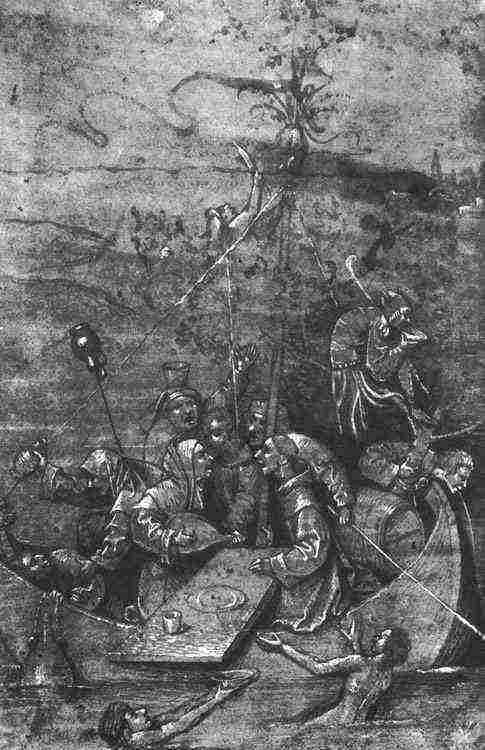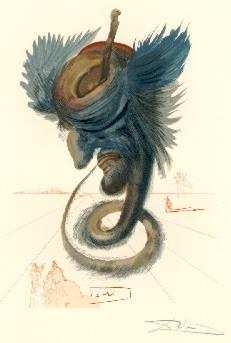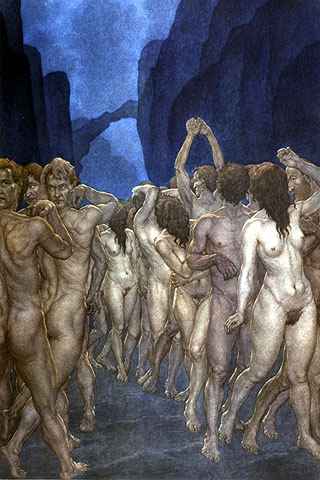 |
 |
 |
|
|
|
|
 |
 |
 |
|
|
|
|
| INF20 |
|
| ........... | ....... G.GUAITA |
................................. H.W.LONGFELLOW |
...... .D.ALIGHIERI |
....... ... | ....... |
| 1
|
Chi
dès
pén'i
divèrsi
i
dév tratè che dal ventézim cant ién l'argumént dla prìma càntica di cundanà. |
Of
a new pain behoves me to make verses And give material to the twentieth canto Of the first song, which is of the submerged. I was already
thoroughly
disposed And people saw I
through
the circular valley, |
Di
nova
pena
mi
conven far versi e dar matera al ventesimo canto de la prima canzon ch'è d'i sommersi. |
| 4
|
Mi
iéra
preparà
e
bèli
pront a vardè giü 'nsal fond ad cùla val che l'éra tüta 'd làcrimi bagnà; |
Io era
già
disposto tutto quanto a riguardar ne lo scoperto fondo, che si bagnava d'angoscioso pianto; |
|
| 7
|
e
i vëd antal valòn vnì avànti
gént
, di 'n pas lént mè l'è cul di prucesiòn: tazìvu tüti e i fàvu 'd lacrimòn. |
e vidi
gente per
lo vallon tondo venir, tacendo e lagrimando, al passo che fanno le letane in questo mondo. |
|
| 10
|
Quànd
i
mè
öc'
a
ién s'ciàrà pü 'n bas, stravòlt ugnün iù vist cun girà 'l col : iàvu al post dal cupët, al barbaròt. |
As
lower down my sight descended on them, Wondrously each one seemed to be distorted From chin to the beginning of the chest; For tow'rds the
reins the
countenance was turned, Perchance indeed
by violence
of palsy |
Come 'l
viso mi scese
in lor più basso, mirabilmente apparve esser travolto ciascun tra 'l mento e 'l principio del casso; |
| 13
|
Cun
la
fàcia
girà
a
l'incuntràri, vèrs dùa i màrciu, lur i vëdu nén; i van avànti cun la schén'a e i rén. |
ché da le
reni era tornato 'l volto, e in dietro venir li convenia, perché 'l veder dinanzi era lor tolto. |
|
| 16
|
Pöl
dèsi
che
a
quaidün
a l'àbia piài na paràlizi a cùla quàzi uguàl; mi iù nén vìstla maj né i crëd che i sìa. |
Forse per
forza già
di parlasia si travolse così alcun del tutto; ma io nol vidi, né credo che sia. |
|
| 19
|
Che
i
pödi
piè
di
sa lesiòn al früt, o vuj che i légi; ma pruvè a pensè se i mè öc' i pudìvu rastè süt, |
As
God may let thee, Reader, gather fruit From this thy reading, think now for thyself How I could ever keep my face unmoistened, When our own
image near me
I beheld Truly I wept,
leaning upon
a peak |
Se Dio ti
lasci,
lettor, prender frutto di tua lezione, or pensa per te stesso com'io potea tener lo viso asciutto, |
| 22
|
quànd
iù
vist
defurmà
nòsa
figüra, cuzì stravòlta che i làcrimi da i öc' finìvu an mès ai ciàpi, 'ntla fesüra. |
quando la
nostra
imagine di presso vidi sì torta, che 'l pianto de li occhi le natiche bagnava per lo fesso. |
|
| 25
|
Mi
i
pianzìva
pustà
tacà
'l custòn dla scugliéra; e 'l maèstru dès am dis: " T'è ànche ti mè i àuti tant cujòn? |
Certo io
piangea, poggiato
a un de' rocchi del duro scoglio, sì che la mia scorta mi disse: «Ancor se' tu de li altri sciocchi? |
|
| 28
|
Chi,
la
pietà
l'è
vìva
quànd l'è
mòrta; iè iün pü dizgrasià ad cul che 'l pròva còntra 'l divìn giüdìsi cumpasiòn? |
Here
pity lives when it is wholly dead; Who is a greater reprobate than he Who feels compassion at the doom divine? Lift up, lift up
thy head,
and see for whom Amphiaraus?
Why dost
leave the war?' |
Qui vive
la pietà
quand'è ben morta; chi è più scellerato che colui che al giudicio divin passion comporta? |
| 31
|
Ausa
la
tèsta
e
vàrda
l'induvìn che quànd, sut lü, la tèra l'è dürvìsi e tüti i Tebàn criàvu : ' 'Ndùa 't vè, |
Drizza la
testa,
drizza, e vedi a cui s'aperse a li occhi d'i Teban la terra; per ch'ei gridavan tutti: "Dove rui, |
|
| 34
|
Anfiarào?
parchè
't
làsi
la
guèra?' e lü a rubatè l'ha seguità fin che 'd Minòsse l'è truvàsi 'n ca. |
Anfiarao?
perché
lasci la guerra?". E non restò di ruinare a valle fino a Minòs che ciascheduno afferra. |
|
| 37
|
Vàrda
'ncul
om
la
stòmi
al post dla schén'a; parchè 'l vulìva vëdi trop avànti, adès avànti 'l va, ma d'arcülòn. |
See, he has made a bosom of his shoulders! Because he wished to see too far before him Behind he looks, and backward goes his way: Behold Tiresias,
who his
semblance changed, And afterwards
was forced
to strike once more |
Mira c'ha
fatto petto
de le spalle: perché volle veder troppo davante, di retro guarda e fa retroso calle. |
| 40
|
Vàrda
Tirézia;
't
sè
ca
l'è cul tal che fümèla l'è vnì da mas'c' che l'éra, e 'd corp l'ha fat an cambiamént tutàl. |
Vedi
Tiresia, che
mutò sembiante quando di maschio femmina divenne cangiandosi le membra tutte quante; |
|
| 43
|
E
prìma
ca
'l
turnéisa
tam mè prìma, l'ha düvì bàti 'ncùra cun la vèrga i duj sarpént che iéru angarbïà. |
e prima, poi,
ribatter li
convenne li duo serpenti avvolti, con la verga, che riavesse le maschili penne. |
|
| 46
|
Cul
che
la
schén'a
al
gìra a la so pànsa, Arùnte l'è, che a Lùni, 'nsla muntàgna, adzùra andùa al rònca al Cararéis, |
That
Aruns is, who backs the other's belly, Who in the hills of Luni, there where grubs The Carrarese who houses underneath, Among the marbles
white a
cavern had And she there,
who is covering
up her breasts, |
Aronta
è quel
ch'al ventre li s'atterga, che ne' monti di Luni, dove ronca lo Carrarese che di sotto alberga, |
| 49
|
tra
i
màrmu
biànc
a
l'àva la so cà e da là, sü, ia stéili e sùta 'l mar 'l pudìva cuntemplè a vuluntà. |
ebbe tra
' bianchi
marmi la spelonca per sua dimora; onde a guardar le stelle e 'l mar no li era la veduta tronca. |
|
| 52
|
Cùla
che
'ndré
avénd
girà
la tèsta, cun i cavéj la cuèrcia i so mamèli e d' l'àuta part a ià cuj àuti péi, |
E quella
che ricuopre
le mammelle, che tu non vedi, con le trecce sciolte, e ha di là ogne pilosa pelle, |
|
| 55
|
l'è
Màntu;
che
'ndà
'n
gir par tànti tèri, pö l'è farmàsi 'ndùa iù nasì; dàmi da mént a lònche iù da dìti. |
Was
Manto, who made quest through many lands, Afterwards tarried there where I was born; Whereof I would thou list to me a little. After her father
had from
life departed, Above in
beauteous Italy
lies a lake |
Manto fu,
che cercò
per terre molte; poscia si puose là dove nacqu'io; onde un poco mi piace che m'ascolte. |
| 58
|
Quànd
l'è
surtì
dal
mond
so pòvri pàri, drucà la sità 'd Bàcco 'n schiavitü' tant témp l' è stàta 'n gir mè 'n vagabònd. |
Poscia
che 'l padre
suo di vita uscìo, e venne serva la città di Baco, questa gran tempo per lo mondo gio. |
|
| 61
|
Al
nord
dla
bèla
Itàlia,
's tròva n lac, 'd cùli àlpi ai pé che l'Almàgna i sèru, adzùra là al Tirö', ad nom Benàc. |
Suso in
Italia bella
giace un laco, a piè de l'Alpe che serra Lamagna sovra Tiralli, c'ha nome Benaco. |
|
| 64
|
An
cuj
mìla
canàj
,
rùzi e ruzët, tra Gàrda , Valcamònica e Apenìn 's bàgna la gént cun l' àqua di cul lac. |
By
a thousand springs, I think, and more, is bathed, 'Twixt Garda and Val Camonica, Pennino, With water that grows stagnant in that lake. Midway a place is
where the
Trentine Pastor, Sitteth
Peschiera, fortress
fair and strong, |
Per mille
fonti,
credo, e più si bagna tra Garda e Val Camonica e Pennino de l'acqua che nel detto laco stagna. |
| 67
|
A
iè
'n
post
là
'n mès , andùa 'l pastùr trentìn e cul ad Brësa e 'l verunéis pudrìu 'sgnè' se i féisu cul camìn. |
Loco
è nel
mezzo là dove 'l trentino pastore e quel di Brescia e 'l veronese segnar poria, s'e' fesse quel cammino. |
|
| 70
|
Là
'ndùa
che
la
rìva
pü sa zbàsa, 's tròva la gran furtësa ad nom Peschiéra, par fè ai Bresiàn e ai Bergàmasc bariéra. |
Siede
Peschiera,
bello e forte arnese da fronteggiar Bresciani e Bergamaschi, ove la riva 'ntorno più discese. |
|
| 73
|
Chi
l'àqua
che
la
crës,
fòra dal lac ad Benàco la sort, e fa 'n bèl fiüm che scüri cmënsa par na piàn'a vërda. |
There
of necessity must fall whatever In bosom of Benaco cannot stay, And grows a river down through verdant pastures. Soon as the water
doth begin
to run, Not far it runs
before it
finds a plain |
Ivi
convien che tutto
quanto caschi ciò che 'n grembo a Benaco star non può, e fassi fiume giù per verdi paschi. |
| 76
|
E
dal
mumént
che
ancù
la pìa andè, pü nén l'ha nom Benàco, si bén Mìncio, fin a Govèrnul, 'ndùa sfòcia 'n Po. |
Tosto che
l'acqua
a correr mette co, non più Benaco, ma Mencio si chiama fino a Governol, dove cade in Po. |
|
| 79
|
A
va
nén
tant
che
'l tròva mè na làma andùa tant s'esténd, e s'ampantàn'a; e 'd solit, l'è bé gràma al témp dl'istà. |
Non molto
ha corso,
ch'el trova una lama, ne la qual si distende e la 'mpaluda; e suol di state talor essere grama. |
|
| 82
|
Pasànd
an
dì
da
lì
cùla selvàtica, l'ha vdì na tèra an mès a cul pantàn, nén cultivà e sénsa di abitànt. |
Passing
that way the virgin pitiless Land in the middle of the fen descried, Untilled and naked of inhabitants; There to escape
all human
intercourse, The men,
thereafter, who
were scattered round, |
Quindi
passando la
vergine cruda vide terra, nel mezzo del pantano, sanza coltura e d'abitanti nuda. |
| 85
|
A
l'è
farmàsi
lì
cun
la so scòrta, luntàn dla sucietà, par fè 'l magìi; tant témp l'è vìvì lì e lì l'è mòrta. |
Lì, per fuggire
ogne consorzio umano, ristette con suoi servi a far sue arti, e visse, e vi lasciò suo corpo vano. |
|
| 88
|
Cuj
òmni
ch'
iéru
prìma
an larg zbardlà, pö lur ién radünàsi andrénta 'n mür che cul pantàn antùrn 'l fàva sicür. |
Li uomini
poi che
'ntorno erano sparti s'accolsero a quel loco, ch'era forte per lo pantan ch'avea da tutte parti. |
|
| 91
|
Sutrà
'l
so
corp,
adzùra
iàn custrüì na sità che l'ha pià 'd Màntua 'l nom parchè cul post a l'àva lé sarnì. |
They
built their city over those dead bones, And, after her who first the place selected, Mantua named it, without other omen. Its people once
within more
crowded were, Therefore I
caution thee,
if e'er thou hearest |
Fer la
città
sovra quell'ossa morte; e per colei che 'l loco prima elesse, Mantua l'appellar sanz'altra sorte. |
| 94
|
Pü
tànti
iéru
'n
témp
i so abitànt prìma che i fularà dal Cazalòdi dai trüc füisu inganà di Pinamònt. |
Già fuor le
genti sue dentro più spesse, prima che la mattia da Casalodi da Pinamonte inganno ricevesse. |
|
| 97
|
Perciò
ti
t'è
vartì
:
se maj 't santìjsi parlè diversamént ad cùla tèra, ricòrdti: verità l'è lònche iù diti. |
Però t'assenno
che, se tu mai odi originar la mia terra altrimenti, la verità nulla menzogna frodi». |
|
| 100
|
E
mi
:"
Che
t'è
razòn son persüàs e lònche 't dìzi, i pìj par or culà; par mi, i àuti versiòn ién mè 'l carbòn; |
And
I: "My Master, thy discourses are To me so certain, and so take my faith, That unto me the rest would be spent coals. But tell me of
the people
who are passing, Then said he to
me: "He who
from the cheek |
E io:
«Maestro,
i tuoi ragionamenti mi son sì certi e prendon sì mia fede, che li altri mi sarien carboni spenti. |
| 103
|
ma
dìmi
se
quaidün
iè
'd cùla gént che sìa bén cunòsi secònd ti; che mèc a cust ai pénsa la mè mént". |
Ma dimmi,
de la gente
che procede, se tu ne vedi alcun degno di nota; ché solo a ciò la mia mente rifiede». |
|
| 106
|
Cul
che
la
bàrba
là
a ià 'nsia spàli - al mè maèstru 'm dis - a l'è vivì quànd che la Grécia ad mas'c' a iàn svüidà |
Allor mi
disse: «Quel
che da la gota porge la barba in su le spalle brune, fu - quando Grecia fu di maschi vòta, |
|
| 109
|
e
ancùra
i
ünic
viv
iéru i maznà. L'éra induvìn e lü 'nsèma a Calcànte l'ha dat al mumént giüst bon par salpè. |
So
that there scarce remained one in the cradle, An augur, and with Calchas gave the moment, In Aulis, when to sever the first cable. Eryphylus his
name was, and
so sings The next, who is
so slender
in the flanks, |
sì
ch'a pena
rimaser per le cune - augure, e diede 'l punto con Calcanta in Aulide a tagliar la prima fune. |
| 112
|
Eurìpilo
l'ha
nom
e
bén
lu cànta mè 't dévi ricurdè, la mè Enèide parchè tlu sè a memòria tüta quànta. |
Euripilo
ebbe nome,
e così 'l canta l'alta mia tragedìa in alcun loco: ben lo sai tu che la sai tutta quanta. |
|
| 115
|
Cul
ca
l'è
màgar
da
zmiè na strìa, Michéle Scòto l'è che certamént al sàva tüti i trüc a dla magìa. |
Quell'altro che ne'
fianchi è così poco, Michele Scotto fu, che veramente de le magiche frode seppe 'l gioco. |
|
| 118
|
Vàrda
Guìdo
Bonàtti
e
l'
Azdént, ch'èsi 'ncù tacà 'l curàm e la trà 'l vurìa, ma trop tàrdi lü 's pantìs. |
Behold
Guido Bonatti, behold Asdente, Who now unto his leather and his thread Would fain have stuck, but he too late repents. Behold the
wretched ones,
who left the needle, But come now, for
already
holds the confines |
Vedi
Guido Bonatti;
vedi Asdente, ch'avere inteso al cuoio e a lo spago ora vorrebbe, ma tardi si pente. |
| 121
|
Vàrda
cùli:
par
fè
'n
misté mischìn la gügia ién lasà, la spòla e 'l füs; cun i èrbi e i buatìn fàvu i fatüri. |
Vedi le
triste che
lasciaron l'ago, la spuola e 'l fuso, e fecersi 'ndivine; fecer malie con erbe e con imago. |
|
| 124
|
Ma
vén
adès,
che
già
l'è 'nsal cunfìn tra n emisféro e l'àut la lün'a, urmàj, e 'l tùca 'l mar 'd Sivìglia adès Caìn; |
Ma vienne
omai, ché
già tiene 'l confine d'amendue li emisperi e tocca l'onda sotto Sobilia Caino e le spine; |
|
| 127
|
a
l'éra
già
iér
nöt
pién'a la lün'a ; ti 't dévi ricurdè, t'avrè 'ncù 'n mént quànd da la scüri l'è gavàti 'd pén'a". |
And
yesternight the moon was round already; Thou shouldst remember well it did not harm thee From time to time within the forest deep." Thus spake he to me, and we walked the while. |
e
già iernotte
fu la luna tonda: ben ten de' ricordar, ché non ti nocque alcuna volta per la selva fonda». |
| 130 | Lü 'm parlàva cuzì e 'ntant i andàvu. | Sì mi parlava, e andavamo introcque. |